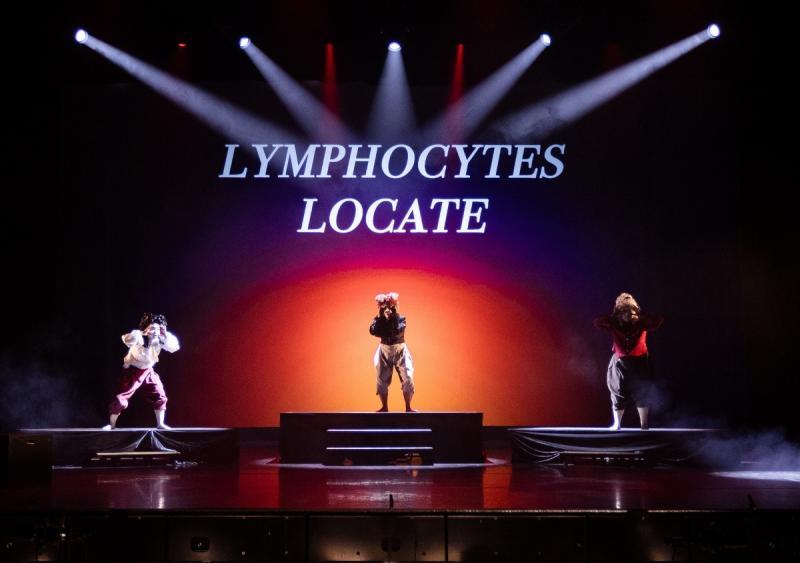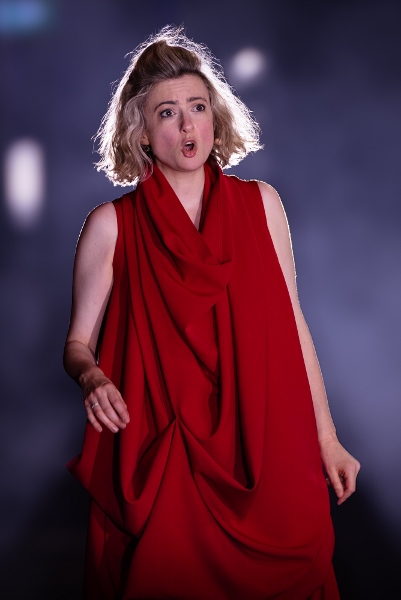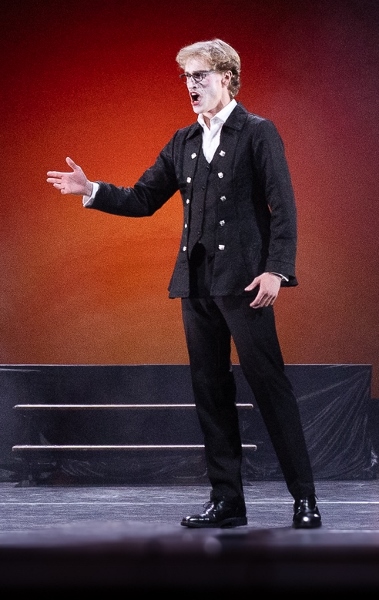Dangerous Matter, RNCM, Manchester review - opera meets science in an 18th century tale | reviews, news & interviews
Dangerous Matter, RNCM, Manchester review - opera meets science in an 18th century tale
Dangerous Matter, RNCM, Manchester review - opera meets science in an 18th century tale
Big doses of history and didaction are injected into 50 minutes of music theatre

Opera can take many forms and fulfil many purposes: this chamber opera by Zakiya Leeming and Sam Redway is about vaccination. Based on history, it has a story to tell and lessons to teach.
“A new opera on medicine, memory and innovation” was the subtitle, and that sums up the themes it explores – but the abstractions are brought to life as aspects of the tale of Lady Mary Wortley Montagu, the early 18th century aristocrat whose experience of a Turkish public bath enabled her to discover and then promote the practice of inoculation (or, to be precise, variolation – introducing infected matter through scratches in the skin).
Asian and African medicine had known for considerable time that in the case of smallpox this would produce a mild infection and often curb the disfiguring effects of catching the virus by breathing it in – and Lady Mary championed the practice many decades before Edward Jenner (and his precursors) established the use of cowpox vaccines to protect against it.
As a piece of musical theatre, it’s open to the criticism that it tries to do too much in too short a time. It’s a one-acter, 50 minutes long, and crams a great deal of story and didaction into that brief time. As an essay in “bringing science and music together”, it furthers the objects of the Royal Northern College of Music’s “PRiSM” (Centre for Practice and Research in Science & Music), where Leeming is a producer in residence.
 The RNCM’s cast of six young singers, led by Rosie Middleton as Lady Mary (pictured left), acquitted themselves with skill, while the orchestra was led by Emily Ampt and the opera conducted by Melvin Tay. Credit for direction is given as Sam Redway Wells, with Elena Whiteley for hair and make-up: there are also some lurid 18th century-looking costumes, and lighting and projection (Simon Alford and David Dickson) and a simple three-platformed set help to present the piece on stage, with recorded spoken sound (Tanguy Pocquet du Haut-Jusse) often carrying the story forward.
The RNCM’s cast of six young singers, led by Rosie Middleton as Lady Mary (pictured left), acquitted themselves with skill, while the orchestra was led by Emily Ampt and the opera conducted by Melvin Tay. Credit for direction is given as Sam Redway Wells, with Elena Whiteley for hair and make-up: there are also some lurid 18th century-looking costumes, and lighting and projection (Simon Alford and David Dickson) and a simple three-platformed set help to present the piece on stage, with recorded spoken sound (Tanguy Pocquet du Haut-Jusse) often carrying the story forward.
It's all the result of collaboration between scientists and musicians, as part of the "Thanks for the Memories" project, led by Paul Klenerman, Professor of Immunology at the University of Oxford, and composer Zakiya Leeming, and supported by the Wellcome Trust.
Lady Mary’s story experience was a personal one: she caught the pox but didn’t die from it (her brother did, and we learn that her close friend Sarah Chiswell did also, in the end). Her skin was left marked for life, however, and the opening part of the opera describes this in vivid metaphors from phenomena of the earth’s surface. She was a woman of great wit and creative ability in a male-dominated world – the libretto rubs in an assertion that in the Middle East she discovered secrets that were known only by women and passed on by women. It also has a shot at the idle aristocracy among whom she was such a remarkable exception – but emphasizes her determination: “The world may not see me, but I shall see it” – a phrase that seems critical to her self-worth yet one that hangs a little oddly in the musical setting.
The idea of “memory” is used in varied ways: one is as a descriptor of the way vaccination conveys immunity, as if the body remembers something through its very cells; one is of the collective wisdom of the medical world; another is of innovation as “new memory”. The staging has some fun in celebrating the role of lymphocytes (white blood cells) without really explaining what they do – okay if you know your medical stuff, but maybe not for everyone else.
One theme is that the establishment of Lady Mary’s day was stuck in traditional understandings of infection and blind to evidence-based reasoning: yet the representatives of the doctors’ profession, in their insistence on proper experimental method (“preparation”) and accurate observation, come across as children of the Enlightenment rather than of superstition and misguided theory. They were surely not wrong in wanting to understand the “how” as well as the “what”.
That they also had a financial stake in the continued acceptance of conventional wisdom, because they earned their living from it, is probably true – but that no doubt applies in the world of knowledge today as much as it ever did.
 Outstanding in the performance was Rosie Middleton as the one singer with but a single role to inhabit: she clearly put her mind to imagining the emotions of her suffering but single-minded heroine, though the vocal writing for her is often more declamatory than lyrical. Oscar Bowen-Hill (pictured right), as spokesman for the medical fraternity, came across as thoughtful (at least as much as 18th century misogyny would have allowed) and demonstrated a nicely developing, well-tuned voice. Ruth Harley’s pure soprano made an excellently innocent Sarah Chiswell, and Jasmine Ai Higgs, Ankur Dang and Yu Chinen worked effectively together, often as a trio in which the lowest voice part was low indeed. The orchestral writing (wide-ranging for an ensemble of 14 and including electronics) is at times strikingly evocative.
Outstanding in the performance was Rosie Middleton as the one singer with but a single role to inhabit: she clearly put her mind to imagining the emotions of her suffering but single-minded heroine, though the vocal writing for her is often more declamatory than lyrical. Oscar Bowen-Hill (pictured right), as spokesman for the medical fraternity, came across as thoughtful (at least as much as 18th century misogyny would have allowed) and demonstrated a nicely developing, well-tuned voice. Ruth Harley’s pure soprano made an excellently innocent Sarah Chiswell, and Jasmine Ai Higgs, Ankur Dang and Yu Chinen worked effectively together, often as a trio in which the lowest voice part was low indeed. The orchestral writing (wide-ranging for an ensemble of 14 and including electronics) is at times strikingly evocative.
Can opera contribute to better understanding of science and even help overcome the vaccine scepticism of our time? It’s not an obvious contender for the role of public educator in that way, but this attempt at pushing its boundaries is a brave one.
rating
Share this article
The future of Arts Journalism
You can stop theartsdesk.com closing!
We urgently need financing to survive. Our fundraising drive has thus far raised £49,000 but we need to reach £100,000 or we will be forced to close. Please contribute here: https://gofund.me/c3f6033d
And if you can forward this information to anyone who might assist, we’d be grateful.

Subscribe to theartsdesk.com
Thank you for continuing to read our work on theartsdesk.com. For unlimited access to every article in its entirety, including our archive of more than 15,000 pieces, we're asking for £5 per month or £40 per year. We feel it's a very good deal, and hope you do too.
To take a subscription now simply click here.
And if you're looking for that extra gift for a friend or family member, why not treat them to a theartsdesk.com gift subscription?
more Opera
 Orpheus and Eurydice, Opera Queensland/SCO, Edinburgh International Festival 2025 review - dazzling, but distracting
Eye-popping acrobatics don’t always assist in Gluck’s quest for operatic truth
Orpheus and Eurydice, Opera Queensland/SCO, Edinburgh International Festival 2025 review - dazzling, but distracting
Eye-popping acrobatics don’t always assist in Gluck’s quest for operatic truth
 MARS, Irish National Opera review - silly space oddity with fun stretches
Cast, orchestra and production give Jennifer Walshe’s bold collage their all
MARS, Irish National Opera review - silly space oddity with fun stretches
Cast, orchestra and production give Jennifer Walshe’s bold collage their all
 Káťa Kabanová, Glyndebourne review - emotional concentration in a salle modulable
Janáček superbly done through or in spite of the symbolism
Káťa Kabanová, Glyndebourne review - emotional concentration in a salle modulable
Janáček superbly done through or in spite of the symbolism
 Buxton International Festival 2025 review - a lavish offering of smaller-scale work
Allison Cook stands out in a fascinating integrated double bill of Bernstein and Poulenc
Buxton International Festival 2025 review - a lavish offering of smaller-scale work
Allison Cook stands out in a fascinating integrated double bill of Bernstein and Poulenc
 Tosca, Clonter Opera review - beauty and integrity in miniature
Happy surprises and a convincing interpretation of Puccini for today
Tosca, Clonter Opera review - beauty and integrity in miniature
Happy surprises and a convincing interpretation of Puccini for today
 Hamlet, Buxton International Festival review - how to re-imagine re-imagined Shakespeare
Music comes first in very 19th century, very Romantic, very French operatic creation
Hamlet, Buxton International Festival review - how to re-imagine re-imagined Shakespeare
Music comes first in very 19th century, very Romantic, very French operatic creation
 Falstaff, Glyndebourne review - knockabout and nostalgia in postwar Windsor
A fat knight to remember, and snappy stagecraft, overcome some tedious waits
Falstaff, Glyndebourne review - knockabout and nostalgia in postwar Windsor
A fat knight to remember, and snappy stagecraft, overcome some tedious waits
 Salome, LSO, Pappano, Barbican review - a partnership in a million
Asmik Grigorian is vocal perfection in league with a great conductor and orchestra
Salome, LSO, Pappano, Barbican review - a partnership in a million
Asmik Grigorian is vocal perfection in league with a great conductor and orchestra
 Semele, Royal Opera review - unholy smoke
Style comes and goes in a justifiably dark treatment of Handelian myth
Semele, Royal Opera review - unholy smoke
Style comes and goes in a justifiably dark treatment of Handelian myth
 Le nozze di Figaro, Glyndebourne review - perceptive humanity in period setting
Mostly glorious cast, sharp ideas, fussy conducting
Le nozze di Figaro, Glyndebourne review - perceptive humanity in period setting
Mostly glorious cast, sharp ideas, fussy conducting
 Fidelio, Garsington Opera review - a battle of sunshine and shadows
Intimacy yields to spectacle as Beethoven's light of freedom triumphs
Fidelio, Garsington Opera review - a battle of sunshine and shadows
Intimacy yields to spectacle as Beethoven's light of freedom triumphs
 Dangerous Matter, RNCM, Manchester review - opera meets science in an 18th century tale
Big doses of history and didaction are injected into 50 minutes of music theatre
Dangerous Matter, RNCM, Manchester review - opera meets science in an 18th century tale
Big doses of history and didaction are injected into 50 minutes of music theatre

Add comment